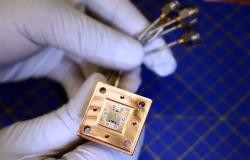A video game to make us not want to open a can of soda or devour pastries between meals: this is the challenge taken by the start-up Neuria, based in Friborg and Lausanne. She has just received 150,000 francs from Venture Kick, a foundation that supports new businesses, to develop her smartphone application which should help influence the eating habits of its users.
The objective is to fight against overconsumption of junk food and therefore against overweight and diabetes. The company comes from the Neuro-rehabilitation Laboratory of the University of Fribourg. The application “acts on the implicit processes of the brain, in order to modify behavior in a lasting way, without conscious effort on the part of the users,” promises Neuria.
Concretely, the player must, for example, select what is healthy as quickly as possible, such as vegetables and fruits, and refrain from clicking on unhealthy foods, such as sodas, fries and hamburgers. The CEO of Neuria, Frédérik Plourde assures that it is not a question of learning what is good or bad, or of refraining from eating: “We don’t see the difference with a standard game.”
What was observed during the tests carried out with a first version of the game is that the reflexes taken on the screen extend into real life. The results of the first studies show that playing regularly allows you to reduce your consumption of products designated as unhealthy by up to 25%. According to the designers, what differentiates this approach from a traditional diet is that it acts directly at the source by modifying the brain’s reward systems. “We don’t say: you have to replace the burger with a salad, because in this case the desire to eat a burger remains. We directly reduce the desire to eat the burger,” summarizes Frédérik Plourde.
Paid version from April
The version intended for the general public of this game is due to be released in April 2025. It will be paid for, via a monthly subscription of less than 10 francs. By paying more, it will be possible to benefit from personalized support from a health professional. Discussions are underway with insurers and the political world so that the use of this application is more financially accessible to people who need it, specifies the CEO of Neuria, Frédérik Plourde.






